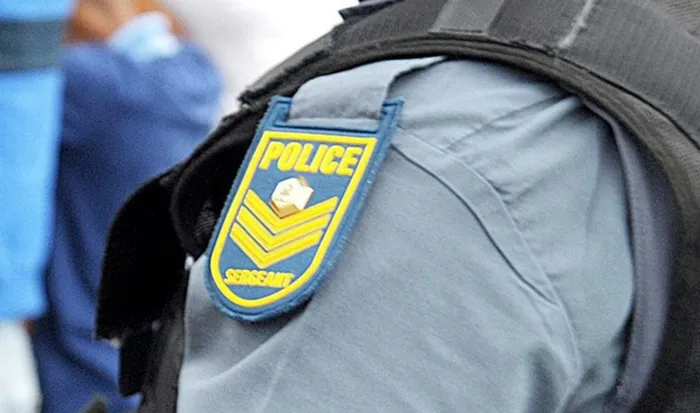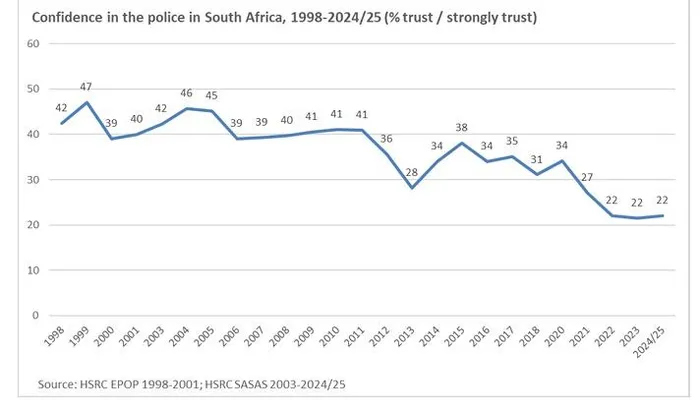Public trust in police reaches all-time low
Confidence levels

Most South Africans who have lost faith in police are victims of crime or those who fear being attacked
Image: Armand Hough
Recent findings reveal that public trust in South African police has plummeted to an all-time low, with only 22% of citizens expressing confidence in law enforcement.
Most South Africans who have lost faith in police are victims of crime or those who fear being attacked, according to findings by the Human Sciences Research Council’s (HSRC) South African Social Attitudes Survey, which was released last week.
The survey found that trust levels in the police have remained relatively low over the 1998 to 2024/2025 period, with only 22% of citizens expressing trust in the police in 2022.
The 2023 and 2024/25 confidence levels were almost unchanged.

Confidence graph
Image: HSRC
“In 2021, public trust in the police was 27%. This appears to be linked to the July 2021 social unrest. Many criticised the poor performance of the police during the unrest.
“This was followed by a further 5% decline to 22% in 2022, with the 2023 and 2024/2025 confidence levels almost unchanged, which may reflect increasing rates for certain crimes. The 2022/2023 and 2024/2025 figures are the lowest recorded in 27 years,” the findings revealed.
Over the 1998 to 2010 period, the average level of trust in the police was relatively static, ranging between 39% and 42%.
The findings indicated that the 2016 to 2020 period was characterised by “modest fluctuation” between 31% and 35%.
“The hard Covid-19 lockdown experience, which included instances of police brutality in enforcing lockdown regulations, did not appear to have had an aggregate effect on confidence levels based on the 2020 survey results.
“In 2021 public trust in the police dipped to a low of 27%, and appeared to be linked to the July 2021 social unrest. Many criticised the poor performance of the police during the unrest.
“Those who displayed lower trust in the police include victims of crime or those who fear being attacked. Well-publicised instances of police abuse or failure can also seem to reduce public confidence.
“Those who had been recent victims of crime displayed significantly lower levels of trust in the police, and fear of crime has a similar effect.
“Higher levels of fear are associated with lower trust in the police. This applies to classic measures such as fear of walking alone in one’s area after dark, as well as crime-specific fears, such as worrying about house robberies or violent assault. These associations have been found across multiple rounds of surveying,” the findings noted.
Some of the suggestions made by the HSRC on how to regain police trust included promoting competent and ethical police leadership and strengthening the overall system of police governance. Suggestions also included that police should put more measures in place to monitor and control the use of force, and promote a culture of police accountability.
"While provincial levels and trajectories have varied, the trend points to a deepening legitimacy crisis for the SAPS across the country, with historically higher-trust provinces converging downward toward the levels of deep scepticism observed in Gauteng and KwaZulu-Natal.
"Well-publicised instances of police abuse or failure can also seem to reduce public confidence. It is evident that in a high-crime and socially-divided society, confidence in the police is made up of a mix of views on the fairness and effectiveness of the police, combined with experiences of crime, including worrying about crime, experiences of policing, and even more general views on the functioning of democracy and government.
"The risk is that low and diminishing confidence in the police, if left unchecked, will also continue to negatively shape views of key elements of police legitimacy, such as a sense of shared moral values and the duty to obey the police," the HSRC said.
Perceptions of police corruption also had a “strong, negative effect” on police confidence.
The survey showed that from past research, the South African public strongly emphasised both police fairness and effectiveness as important elements of their overall assessments of police confidence.
“The more the police are seen to be treating South Africans unfairly, the more they are likely to view the police as untrustworthy. Similarly, perceptions that the police treat people disrespectfully, are not impartial in their decision-making, or lack transparency in the actions (procedural unfairness) also undermine public confidence.
“Lastly, if the police are seen as ineffective, unsuccessful in preventing, reducing and responding to crime, this will also diminish confidence,” the report stated.